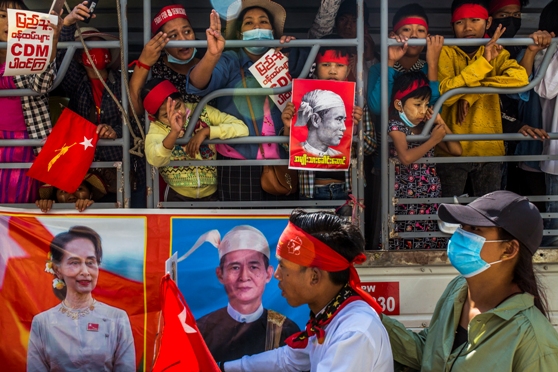Suu Kyi makes first court appearance since coup

By Hannah Beech
NAYPYITAW – For the first time since Myanmar’s military locked her up in a pre-dawn raid as part of its coup Feb. 1, Aung San Suu Kyi, the leader of Myanmar’s ousted civilian government, was seen in person Monday (24) when she sat briefly at a court hearing.
The short appearance at a special court in Naypyitaw, the Southeast Asian country’s capital, was also the first time that most of her legal team had caught a glimpse of their famous client. They have been defending her against a raft of criminal charges that the United Nations and foreign governments say are clearly politically motivated. Most of the country’s elected leadership has been jailed.
In a 30-minute meeting with her lawyers before the hearing, Suu Kyi, who had previously appeared by video link, seemed healthy and resolute, if unclear about just how Myanmar had changed since the coup, a member of her legal team said. Since the putsch, the military has imposed a reign of terror, isolating the country once more from the international community.
Suu Kyi was determined to defend the integrity of her political party, the National League for Democracy, or NLD, her lawyers said.
“Daw Aung San Suu Kyi said that the NLD is the party of the people, and the party will exist as long as the people exist,” said Min Min Soe, a member of her legal team.
Suu Kyi, who spent the better part of two decades locked up by Myanmar’s generals for her campaign for democracy, has been charged with illegally importing walkie-talkies, breaching coronavirus regulations and contravening the Official Secrets Act, among other crimes. Military-linked forces have also accused her of accepting bags of cash and 25 pounds of gold, although she has not been formally charged on those counts.
If she is found guilty of the charges — and Myanmar’s courts have a record of delivering guilty verdicts in political cases — Suu Kyi, 75, could be imprisoned for the rest of her life.
Although Suu Kyi was initially held at her villa in Naypyitaw, she was moved to an undisclosed location a week later, blindfolded while in transit, her lawyer said.
“She doesn’t know where she is living now,” Min Min Soe said. “She doesn’t know anything about what is happening outside.”
Although court proceedings against Suu Kyi have been underway for months, several hearings were cancelled at the last moment because of internet blackouts imposed by the junta. With COVID-19 restrictions in place, some of the hearings were supposed to occur by video link.
Her next scheduled court date is June 7.
On Friday (21), an election official installed by the junta that seized power in February blasted Suu Kyi’s National League for Democracy (NLD) as a breeding ground of “traitors” and said the party would be investigated and possibly dissolved. It is not clear when such a dissolution might take place.
In November, the NLD again trounced the military’s proxy political party in nationwide elections. The lopsided result seemed to blindside some members of the military, even though the league had done the same five years before when it began sharing power with the army.
When the military, known as the Tatmadaw, staged its coup in February, it promised to hold elections within a year. The timetable was then extended to two years. Now, the country is facing the prospect of an election at an indeterminate point in the future without the party that won the most votes from citizens.
The military says that the elections last year were fraudulent, a charge dismissed by international observers and by a national election commission that was disbanded after the coup.
“The NLD cannot be dissolved by force and orders because it is already the party in the hearts of the people,” said Aung Kyi Nyunt, a spokesman for the party. “Abolition through illegal power will not succeed. The NLD will survive and remain strong in Myanmar’s political history.”
Over the weekend in the country’s borderlands, ethnic armed groups claimed that they had killed dozens of Tatmadaw soldiers in offensives, even as the army’s shelling claimed lives of civilians sheltering in a church in eastern Myanmar. In the big cities, including Yangon and Mandalay, protesters organized flash mobs of dissent, scattering quickly as security forces drew near.
More than 800 people have been killed by security forces since the coup, according to a monitoring group, many shot in the head while peacefully protesting. More than 4,200 have been detained.
-New York Times

